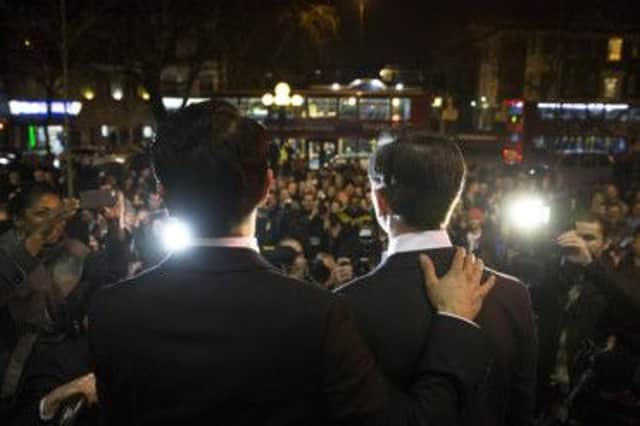‘Historic moment’ as same-sex couples tie the knot


Campaigners and politicians hailed the introduction of legal gay marriage in England and Wales as a “historic moment”.
Peter McGraith, a campaigner and writer from Lanarkshire, was one of the first people to take advantage of the change to the law.
Advertisement
Hide AdAdvertisement
Hide AdHe married his partner David Cabreza in a ceremony at Islington Town Hall in London at one minute after midnight.
The pair, who have been together for 17 years and live in London, have two children.
Human rights campaigner Peter Tatchell acted as chief witness as the couple wed. He said the couple and all the others getting married had “made history” and “made Britain a more tolerant, equal place”.
Legislation has also been passed in Scotland legalising gay marriage, although the first ceremony will not take place until October.
“Three years ago, David asked me to ‘marry’ him, meaning we’d get ‘civilised’ – enter into a civil partnership,” said McGraith after his ceremony. “I accepted, of course. But when it became clear that gay marriage was on the way, I started saying ‘Why don’t we wait until marriage is legal?’ It must be awful if you organised your civil partnership for yesterday when just past midnight you could have been married. It’s like buying the wrong iPhone or something.”
He added: “We are thrilled to be getting married. It is a mark of significant social progress in the UK that the legal distinction between gay and straight relationships has been removed.”
The rainbow flag, adopted as a symbol of the gay community in 1970s San Francisco, yesterday flew above the Cabinet Office and Scotland Office.
The Prime Minister said: “Congratulations to the gay couples who have already been married – and my best wishes to those about to be on this historic day.”
Advertisement
Hide AdAdvertisement
Hide AdMore than 2,000 people and a host of celebrities saw comedian Sandi Toksvig and partner Debbie renew their vows at a public ceremony on London’s South Bank. The couple, who first entered a civil partnership seven years ago, were watched by friends and members of the public as they exchanged vows on stage at the Royal Festival Hall with their four children. The Radio 4 News Quiz presenter said the day was “an astonishing moment in history”.
In a speech, an emotional Toksvig said: “There was many a time I thought this day would never come.”
Speaking of her partner, she said: “We’re still crazy about each other. I can’t believe my luck – look how gorgeous she is. I want a piece of paper to say she won’t ever leave me.”
Civil partnerships were introduced in Britain in 2004. The government has said they can be converted to marriages by the end of the year.
The Marriage (Same Sex Couples) Act came into force in July last year but it was not until 13 March this year that couples were able to register to marry.
In February, the Scottish Parliament passed its own gay marriage law, but the Assembly in Northern Ireland has no plans to follow suit.
Ruth Hunt, acting chief executive for charity Stonewall, which campaigns for lesbian, gay and bisexual equality, said: “The first same-sex marriages in England and Wales are a truly historic moment.
“These weddings will send a powerful signal to every young person growing up to be lesbian, gay or bisexual – you can be who you are and love who you love, regardless of your sexual orientation.”
Advertisement
Hide AdAdvertisement
Hide AdAs many couples tied the knot, a new poll published yesterday revealed that one in five Britons are less likely to vote Conservative because of the same-sex marriage law – with just 14 per cent indicating the policy made them more likely to back David Cameron’s party.